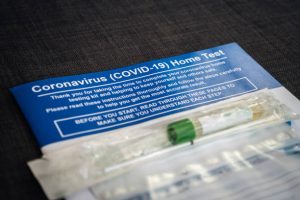Seniors have always been a preferred target for online fraudsters. During the pandemic, which has medically affected the elderly more than any other demographic, this vulnerable group is even more susceptible to 
scamming.
“We are seeing something we’ve never seen before,” Laura Tamblyn-Watts, CEO of Canada’s National Seniors’ Advocacy Organization, CanAge, told CityNews in Toronto. “It’s the perfect storm of targeting our vulnerable people.”
CanAge suggests that one in five seniors are subject to elder abuse, which includes frauds and scams.
As a physician during pandemic times, it is beneficial to be aware of the kinds of health-related scams that can affect your patients as their own worry about their wellbeing can easily lead them into hoaxes that prey on their fears.
Below are a few examples of coronavirus-related scams that have been targeting older adults across Canada, according to the Canadian Anti-Fraud Centre:
COVID-19 test-at-home kits
Scammers looking for credit card or banking information will call, email or text offering coronavirus test kits. They could be posing as any government or health-care agency and be asked to confirm their health card number or social insurance number. This scam also seeks home addresses under the guise of dropping off or mailing out the test kit.
But you may be eligible for free COVID test kits from federal and provincial agencies for you and your employees. Go to https://www.canada.ca/en/public-health/services/diseases/coronavirus-disease-covid-19/testing-screening-contact-tracing/rapid-tests-employees.html
Free masks aren’t really free
Fraudsters are offering either free masks or masks for sale to protect against COVID-19. The free mask scammers are telling Canadians they only need to pay for shipping in order to receive them. This is an attempt at gaining their credit card content. For the mask purchasing scam, the crooks are immediately charging cards for various amounts and the victims never receive any product.
Fake treatments and vaccines
A number of text and phone cons have been falsely advertising drugs, vaccines and devices that claim to prevent or cure COVID-19 – including a “miracle oil” that attempts to get victims to click on a link. Other versions offer services like duct cleaning or mosquito prevention while suggesting the virus can be spread through pests or home ventilation systems.
Government grifting
Emails posing as Employment Insurance COVID-19 suggest victims are required to validate their information. Other reports suggest emails claiming to be from the Public Health Agency of Canada providing updates on COVID-19 direct people to click on a link provided, which then asks for personal information but may also contain malware.
More recently, there are reports of Canadians receiving a text message asking them to click on a link to receive their Government of Canada benefit or to verify their eligibility for financial aid due to COVID-19.
Charity scams
Some Canadians are receiving emails from the World Health Organization, asking for donations to fight COVID-19. Consumers are advised that they can make payments through a secure digital wallet.
Friends and family emergency
Using email addresses from friends or family, online fraudsters are posing as pals to ask for financial aid, often claiming they have COVID-19 and need money for their medical care – seeking support through email money transfer.
Some of these might seem easy to spot but sharing this knowledge with your patients can help them prepare for possible pandemic scams.
It’s important not to lose track of your own online security while looking out for your patients, as well. As part of your own online security, make sure you only use reliable sources for your medical transcription, ensuring your physician dictation is safely converted into the files you need.
Click to read Part I and Part 2.
2Ascribe Inc. is a medical transcription services agency located in Toronto, Ontario Canada, providing medical transcription services to physicians, clinics, and other healthcare providers across Canada. Our medical transcriptionists take pride in the quality of your transcribed documents. WEBscribe is our client interface portal for document management. 2Ascribe continues to implement and develop technology to assist and improve the transcription process for physicians and other healthcare providers, and recently introduced AUTOfax. AUTOfax works within WEBscribe to automatically send faxes to referring physicians when a document is signed off by the healthcare professional. As a service to our clients and the healthcare industry, 2Ascribe offers articles of interest to physicians and other healthcare professionals, medical transcriptionists, and office staff, as well as of general interest. Additional articles may be found at http://www.2ascribe.com.


